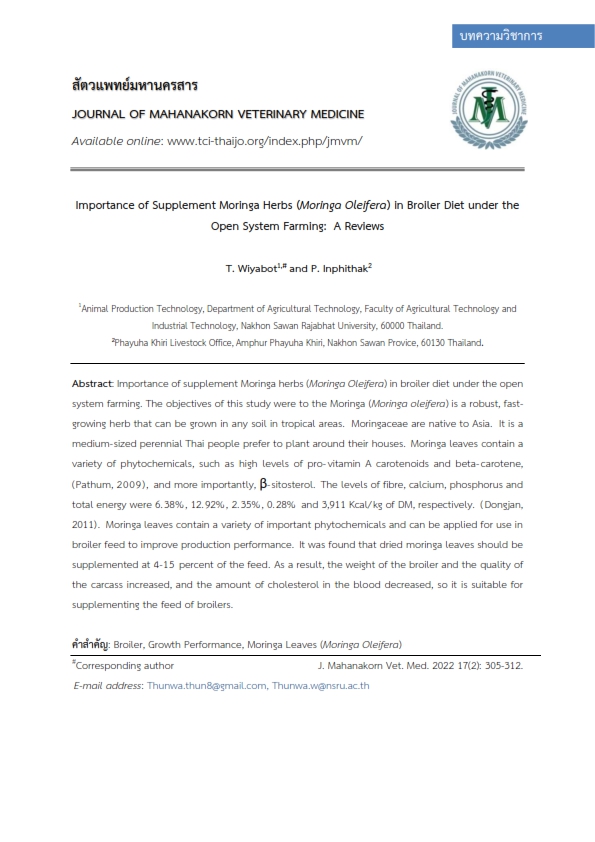Importance of Supplement Moringa Herbs (Moringa Oleifera) in Broiler Diet Under the Open System Farming: A Reviews -
Main Article Content
Abstract
Importance of supplement Moringa herbs (Moringa Oleifera) in broiler diet under the open system farming. The objectives of this study were to the Moringa (Moringa oleifera) is a robust, fast-growing herb that can be grown in any soil in tropical areas. Moringaceae are native to Asia. It is a medium-sized perennial Thai people prefer to plant around their houses. Moringa leaves contain a variety of phytochemicals, such as high levels of pro-vitamin A carotenoids and beta-carotene, (Pathum, 2009), and more importantly, β-sitosterol. The levels of fibre, calcium, phosphorus and total energy were 6.38%, 12.92%, 2.35%, 0.28% and 3,911 Kcal/kg of DM, respectively. (Dongjan, 2011). Moringa leaves contain a variety of important phytochemicals and can be applied for use in broiler feed to improve production performance. It was found that dried moringa leaves should be supplemented at 4-15 percent of the feed. As a result, the weight of the broiler and the quality of the carcass increased, and the amount of cholesterol in the blood decreased, so it is suitable for supplementing the feed of broilers.
Article Details

This work is licensed under a Creative Commons Attribution-NonCommercial-NoDerivatives 4.0 International License.
References
Adulsak, C. 2017. Moringa a local Vegetable, medicinal properties, beneficial to the body planted along the fence not damaged. [cited 2019 December 23]. Available from: URL: https://www.technologychaoban.com/thai-local-wisdom/article_22009.
Abhishek, K., K. Kaushalendra, K. Sanjay, K.S. Pankaj, K.P. Jitendra, and M. Chandra. 2018. Effect of feeding Moringa oleifera leaf meal on production efficiency and carcass characteristics of vanaraja chicken in tropics. International Journal of Current Microbiology and Applied Sciences. 7: 1213-1217.
Anwar, F., S. A. Lafif, M. Shraf and A.H. Gilani. 2007. Review article Moringa oleifera: A food plant with multiple medicinal uses. Phytother. Res. 21: 17-18.
Chivapat, S., P. Sincharoenpokai, N. Saktiyasuthorn, A, Shuaprom, P. Thongsriral, H. Sakpetch, and A. Rungsipipat. 2011. Acute and chronic toxicity of Moriga oleifera linn. leaves extracts. Thai J. Vet. Med. 41: 417-427.
Isdakorn, B. 2017. Influence of Moringa leaf supplementation on the growth performance of broilers. Department of Animal Science, Faculty of Natural Resources Prince of Songkla University.
Kavoi, B.M. 2016. Effects of dietary Moringa oleifera leaf meal supplementation on chicken intestinal structure and growth erformance. Journal of Morphological Sci. 33: 189-193.
Lakshmipriya, G., D. Kruthi, and S.K. Devarai. 2016. Moringa oleifera: A review on nutritive importance and its medicinal application. Food Science and Human Wellness. 5: 49-57.
Matsuoka, K., T. Nakazawa, A. Nakamura, C., Honda, K., Endo, and M. Sukada. 2008. Study of thermodynamic parameters for solubilization of plant sterol and stanol in bile salt micelles. Chem. Phys. Lipids. 154: 87-96.
Nabila I.E., S. E. Eman, and A.A. Enas. 2015. Effect of moringa leaves on lipid content of table eggs in layer hens. Egypt J. Chem. Environ. Health. 1: 291-11.
Nithima, C. 2017. Moringa leaves. healthy feed for poultry production, safety. [Serial online] eds [cited 2020 January 12]. Available from: URL: https://webs.rmutl.ac.th/assets/upload/files/2017/11/2017110307505632600.p
Office of Agricultural Economics. 2020. Important Agricultural Product Situations and Trends for 2020. Office of Economic Affairs. Agriculture. 154-162.
Pathum, S. 2009. Nutritional and medicinal value of Moringa herbs. [cited 2020 January 18]. Available from: URL: https://marumoil. Word press.com/2011/12/07.
Phaichok, P.J. 2015. The influence of dietary moringa leaf powder supplementation on the production and plasma lipids of chicken capacity Krathong. Science and Technology. 23: 283-289.
Puchong, W, and P. Paichok. 2015. Influence of Moringa leaf powder supplementation in laying hen feed on productivity and egg quality. Science and technology. 23: 293-312.
Pathum, S. 2000. Nutritional and medicinal value of Moringa herbs. [cited 2020 January 12]. Available from: URL: https://webs.baanjomyut.com/library_2/extensionnutritional_andmedicinalerbs_horseradish/index.ht ml.
Rattasak, P. 2009. Moringa miracle plant herb panacea. Kasikorn. 82: 61-68.
Sahay S., Upasana Y., Sheetal S. 2017. Potential of Moringa oleifera as a functional food ingredient. A review. International Journal of Food Science and Nutrition. 2: 31-37.
Somphech, S., C. Nithima, N. Boonchu, and C. Thanyarat. 2013. Effect of Moringa leaves in food on production performance, carcass quality and meat quality of broiler chickens. Proceeding of Kasetsart Naresuan. July 30 – 31, 2013. Faculty of Agriculture, Natural Resources and Environment Naresuan University. Phitsanulok.
Thanadet, M., T. Suchon, and C. Boonlombe. 2004. Reduction of fat and cholesterol in broilers with dietary chitosan supplementation. [Serial online] [cited 2020 January 12]. Available from: URL: http://www.lib.ku.ac.th/KUCNF/KC4202031.pdf.
Uthaiwan, S. 2012. Moringa. [cited 2019 December 18]. Available from: URL: http://www.aopdh07.doae.go.th/download/%E0%B8%82%E0pdf.
Wei, L.J., H.J. Wang, and S.G. Zhang. 2016. Evaluation of Moringa oleifera leaf in laying hens: effects on laying performance, egg quality, plasma biochemistry and organ histopathological indices. Italian Journal of Animal Science. 15: 658-670.
Zanu H.K, P. Asiedu, M. Tampuori, and M. Abada. 2012. Asante Possibilities of using Moringa (Moringa oleifera) leaf meal as a partial substitute for fishmeal in broiler chicken diets. Online Journal of Animal and Feed Research. 2: 70-85.


